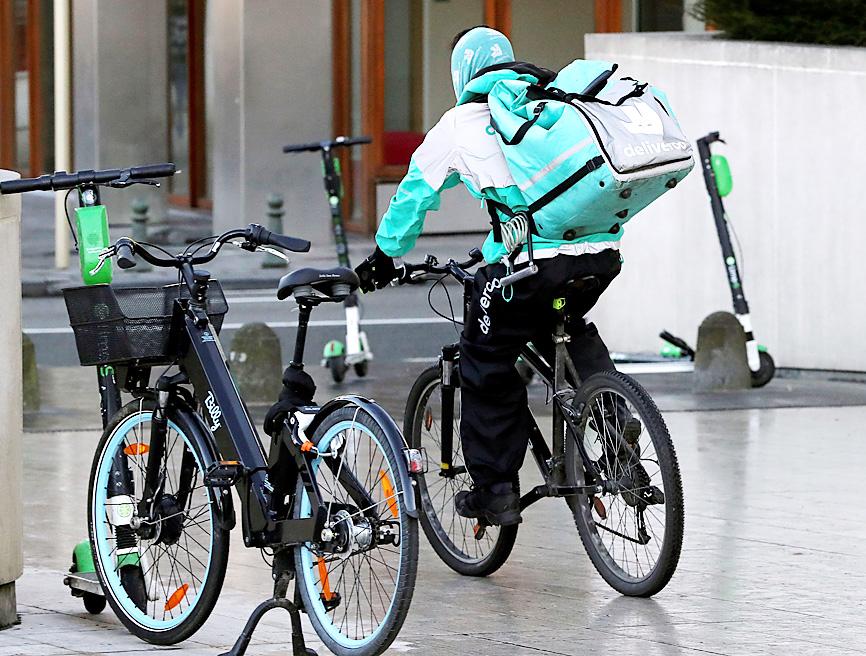A trade union yesterday called for Deliveroo’s UK riders to strike when the meal delivery service floats on the stock market next month, saying the action would highlight dissatisfaction with the company’s business model and approach to workers’ rights.
Deliveroo, whose turquoise-uniformed couriers delivering chicken kormas and hot pizzas are a common sight in many British suburbs, is set for Britain’s biggest stock market debut in nearly a decade, after setting a share price range that values it at up to US$12 billion.
Some investment firms have said they will not participate in the initial public offering (IPO).

Photo: Reuters
Insurer Aviva PLC for instance highlighted a lack of rights for riders as an investment risk as the company might be forced to change its business model.
Investor demand had continued to build since its road show began on Monday last week, Deliveroo said, adding that the views of the Independent Workers’ Union of Great Britain (IWGB), which called for the strike, did not represent the majority of riders.
The union previously lost a legal challenge to Deliveroo in 2018. The case sought to secure rights such as the UK minimum wage for riders, but the court ruled that riders were self-employed.
“Investing in Deliveroo means associating yourself with the exploitative and unstable business model,” IWGB president Alex Marshall said in a statement, adding that the strike was planned for Wednesday next week, to coincide with the IPO.
The rights of people who work in the so-called “gig economy” have been an increasing focus in Britain. Ride-hailing app Uber gave its workers more entitlements earlier this month after losing a UK Supreme Court case.
Job satisfaction levels among its 50,000 self-employed riders in Britain was at an all-time high, and that the flexibility they had was a big attraction, Deliveroo said.
“Thousands apply to work with us every week, reflecting the strong demand for our on-demand model,” a company spokeswoman said.

NEW IDENTITY: Known for its software, India has expanded into hardware, with its semiconductor industry growing from US$38bn in 2023 to US$45bn to US$50bn India on Saturday inaugurated its first semiconductor assembly and test facility, a milestone in the government’s push to reduce dependence on foreign chipmakers and stake a claim in a sector dominated by China. Indian Prime Minister Narendra Modi opened US firm Micron Technology Inc’s semiconductor assembly, test and packaging unit in his home state of Gujarat, hailing the “dawn of a new era” for India’s technology ambitions. “When young Indians look back in the future, they will see this decade as the turning point in our tech future,” Modi told the event, which was broadcast on his YouTube channel. The plant would convert

‘SEISMIC SHIFT’: The researcher forecast there would be about 1.1 billion mobile shipments this year, down from 1.26 billion the prior year and erasing years of gains The global smartphone market is expected to contract 12.9 percent this year due to the unprecedented memorychip shortage, marking “a crisis like no other,” researcher International Data Corp (IDC) said. The new forecast, a dramatic revision down from earlier estimates, gives the latest accounting of the ongoing memory crunch that is affecting every corner of the electronics industry. The demand for advanced memory to power artificial intelligence (AI) tasks has drained global supply until well into next year and jeopardizes the business model of many smartphone makers. IDC forecast about 1.1 billion mobile shipments this year, down from 1.26 billion the prior

People stand in a Pokemon store in Tokyo on Thursday. One of the world highest-grossing franchises is celebrated its 30th anniversary yesterday.

Zimbabwe’s ban on raw lithium exports is forcing Chinese miners to rethink their strategy, speeding up plans to process the metal locally instead of shipping it to China’s vast rechargeable battery industry. The country is Africa’s largest lithium producer and has one of the world’s largest reserves, according to the US Geological Survey (USGS). Zimbabwe already banned the export of lithium ore in 2022 and last year announced it would halt exports of lithium concentrates from January next year. However, on Wednesday it imposed the ban with immediate effect, leaving unclear what the lithium mining sector would do in the